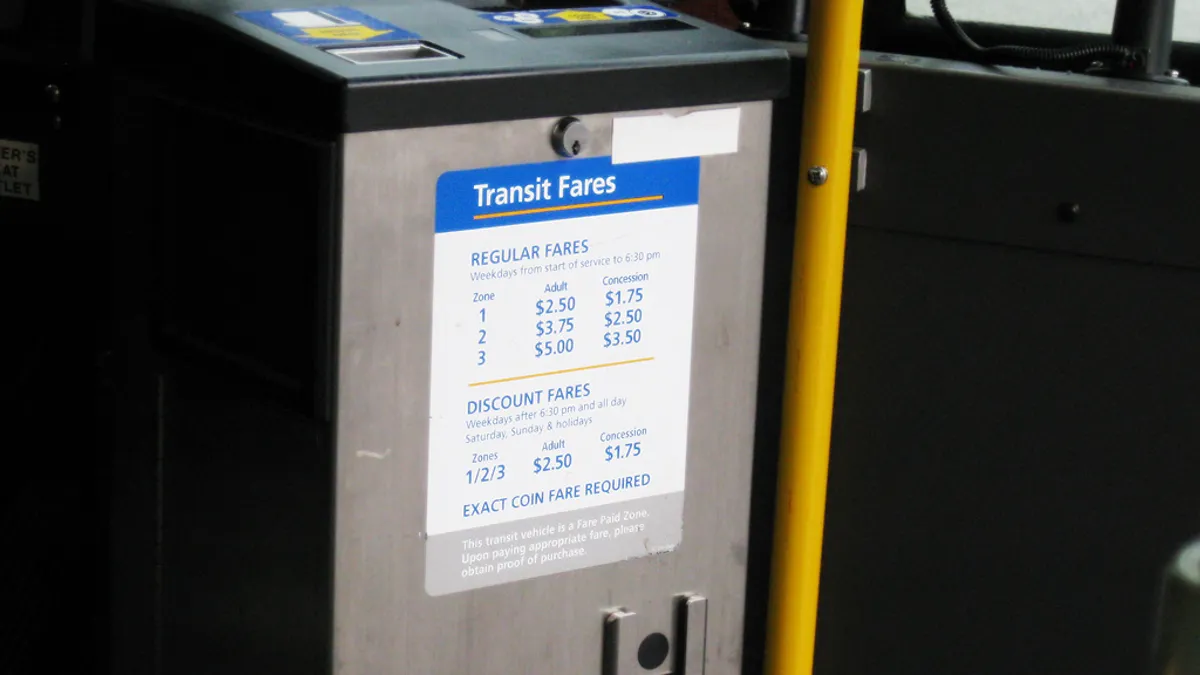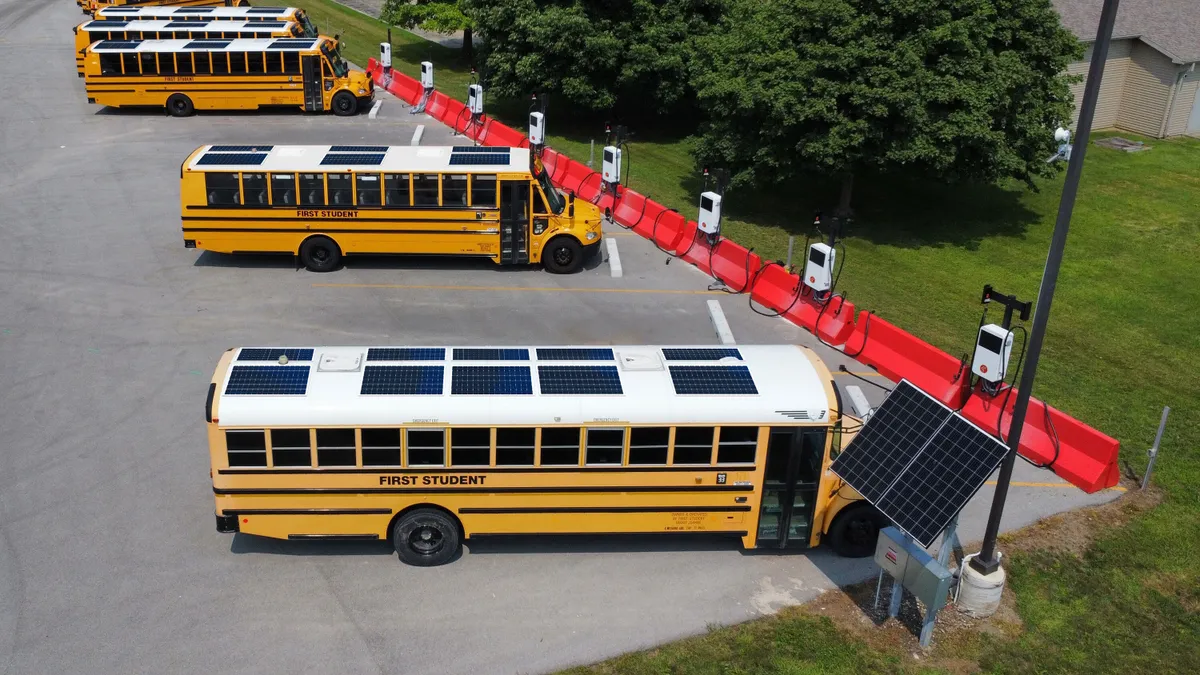As the Washington Metropolitan Transit Authority (WMATA) weighs the pros and cons of moving away from cash payment for bus shares, the agency knows it must strike a balance between transaction expediency and protecting the underbanked population.
WMATA is looking to go cashless at several limited-stop bus routes, having already begun a pilot on one of its routes in June. And with the agency’s board of directors set to receive public feedback in November as part of what WMATA calls the “final decision making process,” there appears to be strong support for that cashless pilot.
In a series of information boards presented by WMATA at a September open house, and in a pamphlet distributed to bus riders, staff said passenger boarding and fare payment can take up to 25% of travel time on a bus route. The agency said 88% of its riders use its refillable plastic SmarTrip cards, so a transition to cashless would affect only a small portion of riders.
Meanwhile, WMATA cited research from TransitCenter and the National Association of City Transportation Officials showing that U.S. buses spend nearly one-third of their time sitting — or "dwelling" — while riders pay their fare, which further supports the cashless argument.
"Research shows that cash payments take significantly longer than SmarTrip taps, and takes even longer when customers add value to a SmarTrip card at the farebox," WMATA officials said in a statement announcing a possible cash-free expansion. "These transactions cause the bus to hold longer at the bus stop, resulting in a longer trip for all riders."
To ensure the cards and the ability to refill them are accessible, WMATA said there are still plenty of options for riders who use cash, including the ability to top up at CVS and other retail locations, while local bus routes will continue to accept cash payments.
A case for the underbanked
Other cities have started to move toward cashless transit, presenting a precedent for WMATA’s latest moves. London has gotten rid of cash fares completely, and it is part of a wider trend in Scandinavian countries such as Sweden that have gone cashless across their society.
The trend comes with transit agencies looking for different ways to manage fare collection. In a research report by Mass Transit, cash handling and operations was viewed as the second-biggest concern of transit agencies, especially as cash collection systems often require far more expenditure on maintenance than other systems.
"[A] speedier bus should not be a result of leaving some of our residents behind."

David Grosso
DC Council Member
But the move in Washington, DC has some advocates uneasy. DC Council Member David Grosso, I-At Large, sent a letter to WMATA Board Chair Jack Evans raising concerns about the impact of the cashless bus pilot program on low-income and disabled riders.
"It is very important that we continue efforts to make our buses more efficient and faster, and I have no doubt that this proposed pilot for the 79 bus will show that this reduces overall trip times," Grosso wrote. "However, a speedier bus should not be a result of leaving some of our residents behind."
In his letter, Grosso said those who rely on cash, either because they do not have a bank account or prefer to manage their finances by using cash only — known as "underbanked" — could have longer commutes as it will be harder to find and use a machine to reload their travel cards.
And for those who work in the service industry and are paid in cash, such a cashless rollout could be a struggle, said David Rothstein, a principal at the nonprofit Cities for Financial Empowerment Fund (CFE Fund), which looks to work with local governments to help them provide finance options for low and moderate-income residents.
"Especially if someone doesn't have regular hours or is in a type of job that's not going to pay them through direct deposit, they're still going to be in that cash economy," Rothstein told Smart Cities Dive. "More and more vendors are moving for security reasons, for safety reasons, for efficiency reasons, to either no cash or quicker access to the services by swiping a card. And I don't think that the legislative route of dictating what they can and can't accept is going to change that trend. That's just the way that a lot of this is moving for certain payments."
In response to Grosso’s letter, WMATA General Manager Paul Wiedefeld assured him that appropriate steps are being taken to inform customers of the change and of their options if they rely on cash.
Grosso’s office said in a statement they would have liked to see him offer new ways to help passengers that rely on cash, but he "awaits the result of the pilot program and will continue to monitor its potential expansion to other routes to ensure that WMATA buses remain an option for all residents.”
In a similar vein, Grosso has raised concerns about city restaurants going cashless, and introduced legislation to ban the practice in DC. “Practices like this further stratify our diverse city when we should be working to foster greater inclusion,” Grosso said in a statement on that bill’s introduction.
His concerns are similar to those raised in Boston, where advocates worry some bus riders who do not live on the ends of routes will have a harder time topping up their cards. In an interview with TransitCenter in 2016, David Block-Schachter, chief technology officer at the Massachusetts Bay Transportation Authority (MBTA), said the city won't skip straight to cashless bus routes to ensure low-income riders are not left behind.
Moving toward a cashless society
The move away from cash and into new technologies has accelerated in recent years, and partnerships between Mastercard and Microsoft on various smart cities initiatives are indicative of how financial institutions are looking to technology to ease the payment process.
That technological evolution could extend to ATMs themselves, said David Tente, executive director for the United States and Latin America at the ATM Industry Association. He said ATM upgrades will be arriving in the coming years, with the new machines potentially addressing the balance between cash-based customers and a much needed mobile-integrated process.
"We see that the ATM is going to be more like your smartphone or your tablet, and if you want a new app to do something different, to take a different type of payment or add functionality to it, it's going to be a fairly simple matter of adding that app onto the system, and we won't have quite the fiasco we have today with having to get everything tested and certified and so forth from six different vendors in order to make one new function happen," Tente told Smart Cities Dive.
Rothstein said cities should do more to encourage low-income residents to have bank accounts that require only $25 or less to be opened, give free access at a branch or at an in-network ATM, and have no load fees for when someone needs to pay cash into their account.
CFE Fund has national standards for such accounts through its Bank On initiative, something Rothstein said more and more cities are signing up to participate in, including DC.
"The benefits of having a bank account over being in a complete cash society are huge if the account is the right kind," he said. "[When] a public transportation agency or a utility company decides to no longer accept cash, they're already in one of these accounts and can easily start to make payments in an efficient way for themselves."




















